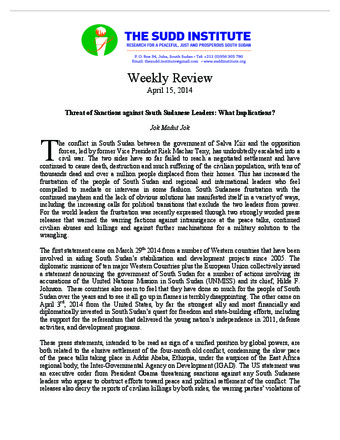Threat of Sanctions against South Sudanese Leaders: What Implications?
Publication Summary
The conflict in South Sudan between the government of Salva Kiir and the opposition forces, led by former Vice President Riek Machar Teny, has undoubtedly escalated into a civil war. The two sides have so far failed to reach a negotiated settlement and have continued to cause death, destruction and much suffering of the civilian population, with tens of thousands dead and over a million people displaced from their homes. This has increased the frustration of the people of South Sudan and regional and international leaders who feel compelled to mediate or intervene in some fashion. South Sudanese frustration with the continued mayhem and the lack of obvious solutions has manifested itself in a variety of ways, including the increasing calls for political transitions that exclude the two leaders from power. For the world leaders the frustration was recently expressed through two strongly worded press releases that warned the warring factions against intransigence at the peace talks, continued civilian abuses and killings and against further machinations for a military solution to the wrangling.
The first statement came on March 29th 2014 from a number of Western countries that have been involved in aiding South Sudan’s stabilization and development projects since 2005. The diplomatic missions of ten major Western Countries plus the European Union collectively issued a statement denouncing the government of South Sudan for a number of actions involving its accusations of the United Nations Mission in South Sudan (UNMISS) and its chief, Hilde F. Johnson. These countries also seem to feel that they have done so much for the people of South Sudan over the years and to see it all go up in flames is terribly disappointing. The other came on April 3rd, 2014 from the United States, by far the strongest ally and most financially and diplomatically invested in South Sudan’s quest for freedom and state-building efforts, including the support for the referendum that delivered the young nation’s independence in 2011, defense activities, and development programs.
This review weighs the impact of both the government’s approach to the crisis and the current position taken by the Western countries.
Jok Madut Jok is trained in the anthropology of health and holds a Ph.D. from the University of California, Los Angeles (UCLA). He is a fellow of Rift Valley Institute and Director of the Sudd Institute. Jok has held fellowship positions at a number of other institutions, including the United States Institute of Peace and the Woodrow Wilson International Center for Scholars. He also served in the Government of South Sudan as undersecretary in the Ministry of Culture and Heritage for three years. He has also worked in aid and development and author of four books and numerous articles covering gender, sexuality and reproductive health, humanitarian aid, ethnography of political violence, gender-based violence, war and slavery, and the politics of identity in South Sudan and Sudan. His book Breaking Sudan: The Search for Peace, was published in 2017 by OneWorld.

